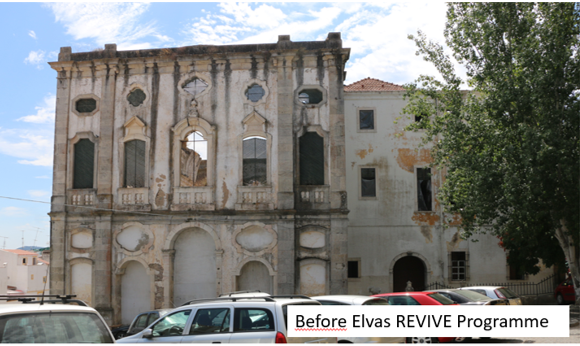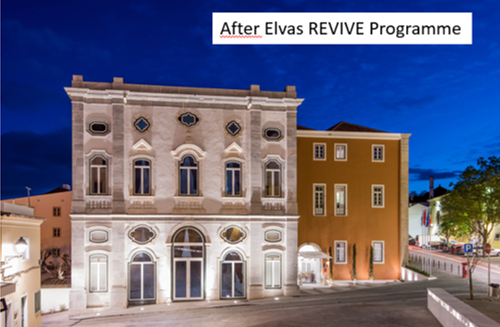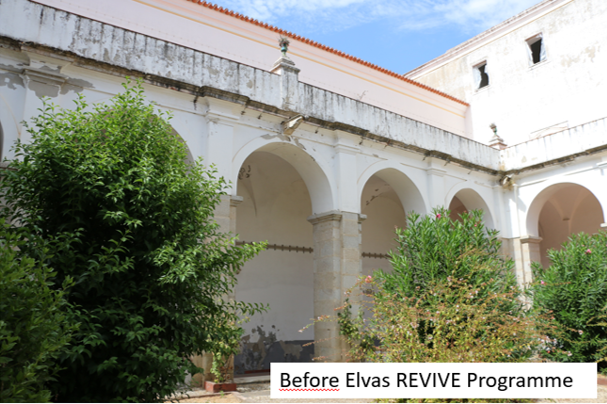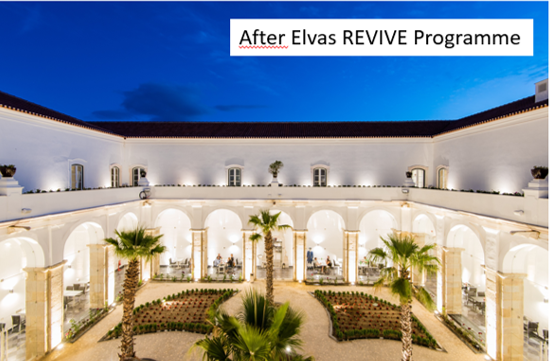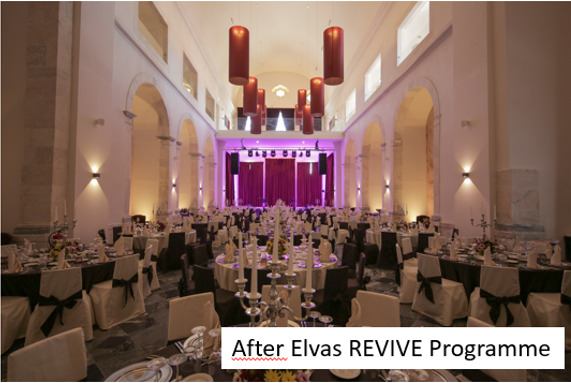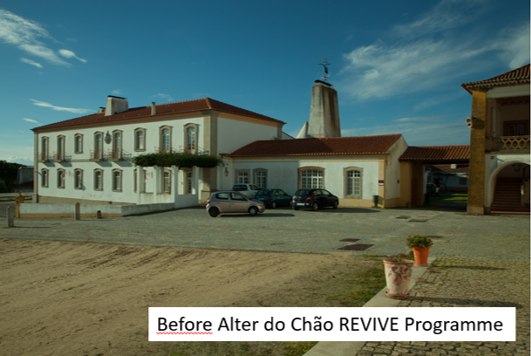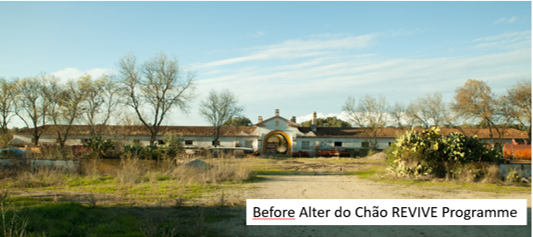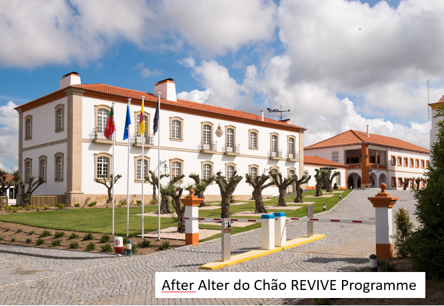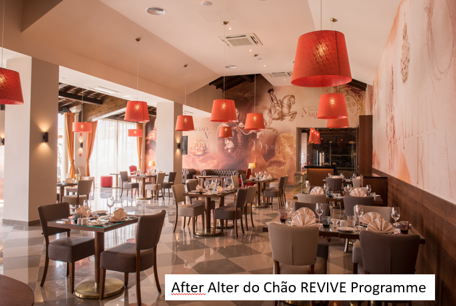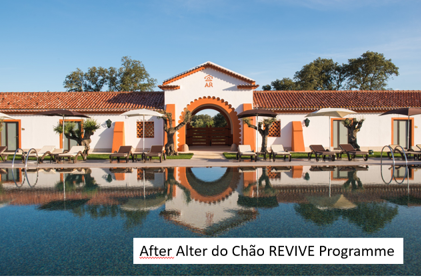REVIVE
Basic information
Project Title
REVIVE
Full project title
Reviving public heritage into sustainable tourism in Portugal
Category
Regaining a sense of belonging
Project Description
The REVIVE programme by Turismo de Portugal involves the transformation of neglected public heritage sites of exceptional cultural and historical value into sustainable and profitable tourism accommodations that prioritise the community and the region. This is a joint project involving public authorities, private entities and local communities. Thanks to its objectives and innovative governance model, REVIVE stands out as a best practice in tourism sustainability and cultural preservation.
Geographical Scope
National
Project Region
Portugal
Urban or rural issues
Mainly rural
Physical or other transformations
It refers to a physical transformation of the built environment (hard investment)
EU Programme or fund
No
Description of the project
Summary
REVIVE Programme, launched in 2016, aims to recover derelict public properties of high heritage value and give it back to the community, by streamlining the necessary private investments to make them suitable for a profitable economic activity, with a tourist vocation.
Sustainability is a key pillar, by reinforcing the attractiveness of regional destinations, including less touristic ones, therefore promoting decentralization of touristic demand, as well as contributing to the economic and social cohesion of the Portuguese territory as a whole.
At this stage, 29 public tenders have been launched under this programme, covering the entire Portuguese territory, and 21 concessions have already been formalized.
We highlight two REVIVE projects (both funcioning in the interior of Portugal):
_ 4* “Vila Galé Collection Elvas, Historic Hotel, Conference & Spa located in the former Convent of São Paulo and sitting at UNESCO world heritage village of Elvas; https://www.vilagale.com/en/hotels/alentejo/vila-gale-collection-elvas and
_ 4* “Vila Galé Collection Alter Real, Equestrian Resort, Conference & Spa integrated in the Coudelaria (horse farm) of Alter (home of the thoroughbred Lusitano horse) in Alter do Chão village- https://www.vilagale.com/en/hotels/alentejo/vila-gale-collection-alter-real
The results have been very positive bringing tangible benefits for local communities, with creation of local jobs and the revitalization of the villages, reinforcing community feeling of belonging and contributing to local and regional economy across the territory. REVIVE has been highly successful in recovering “forgotten” classified sites into cultural tourism scenarios, as the requalification of these properties implies the rediscovery of the country's history through new archaeological findings and studies and its subsequent dissemination to the overall public, allowing the preservation of unique heritage sites and revitalising local entity of the community.
Sustainability is a key pillar, by reinforcing the attractiveness of regional destinations, including less touristic ones, therefore promoting decentralization of touristic demand, as well as contributing to the economic and social cohesion of the Portuguese territory as a whole.
At this stage, 29 public tenders have been launched under this programme, covering the entire Portuguese territory, and 21 concessions have already been formalized.
We highlight two REVIVE projects (both funcioning in the interior of Portugal):
_ 4* “Vila Galé Collection Elvas, Historic Hotel, Conference & Spa located in the former Convent of São Paulo and sitting at UNESCO world heritage village of Elvas; https://www.vilagale.com/en/hotels/alentejo/vila-gale-collection-elvas and
_ 4* “Vila Galé Collection Alter Real, Equestrian Resort, Conference & Spa integrated in the Coudelaria (horse farm) of Alter (home of the thoroughbred Lusitano horse) in Alter do Chão village- https://www.vilagale.com/en/hotels/alentejo/vila-gale-collection-alter-real
The results have been very positive bringing tangible benefits for local communities, with creation of local jobs and the revitalization of the villages, reinforcing community feeling of belonging and contributing to local and regional economy across the territory. REVIVE has been highly successful in recovering “forgotten” classified sites into cultural tourism scenarios, as the requalification of these properties implies the rediscovery of the country's history through new archaeological findings and studies and its subsequent dissemination to the overall public, allowing the preservation of unique heritage sites and revitalising local entity of the community.
Key objectives for sustainability
REVIVE is integrated in the National Sustainable Tourism Plan 2020-23 of Turismo de Portugal as a strategic programme for enhancing of cultural heritage through the preservation of tangible and intangible values that characterise and differentiate Portugal’s regions as a tourist destination.
In line with European Green Deal and with NEB values, REVIVE aims to ensure that economic activities are viable in the long term, make appropriate use of environmental resources and respect the socio-cultural authenticity of local communities.
From an environmental point of view, the focus on recovering dilapidated or abandoned public properties promotes a responsible growth of the touristic offer without increasing the number of new tourism accommodations and consequent increment of impermeable areas of soil.
Furthermore, REVIVE adapts public tender requirements to environmental indicators whenever justified according to properties characteristics (e.g. the tender for Bussaco Palace, located within "Mata Nacional do Bussaco" - natural heritage, will imply the implementation of a biomass station to be fed by products resulting from forest cleaning).
Each REVIVE property investor presents a periodic sustainability report focused on efficient use of resources by monitoring a clean, circular economy and energy efficient solutions. The Sustainability Environmental Indicators taken into consideration are water and energy consumption, impact on biodiversity, waste management and circular economy impact, especially concerning food, as well as reduction of greenhouse gases. Also, several measures have been taken to reduce consumer waste such as timers, flow reducers, changers of pressure charge, efficient showers and toilets with flow reducers and timers.
In line with European Green Deal and with NEB values, REVIVE aims to ensure that economic activities are viable in the long term, make appropriate use of environmental resources and respect the socio-cultural authenticity of local communities.
From an environmental point of view, the focus on recovering dilapidated or abandoned public properties promotes a responsible growth of the touristic offer without increasing the number of new tourism accommodations and consequent increment of impermeable areas of soil.
Furthermore, REVIVE adapts public tender requirements to environmental indicators whenever justified according to properties characteristics (e.g. the tender for Bussaco Palace, located within "Mata Nacional do Bussaco" - natural heritage, will imply the implementation of a biomass station to be fed by products resulting from forest cleaning).
Each REVIVE property investor presents a periodic sustainability report focused on efficient use of resources by monitoring a clean, circular economy and energy efficient solutions. The Sustainability Environmental Indicators taken into consideration are water and energy consumption, impact on biodiversity, waste management and circular economy impact, especially concerning food, as well as reduction of greenhouse gases. Also, several measures have been taken to reduce consumer waste such as timers, flow reducers, changers of pressure charge, efficient showers and toilets with flow reducers and timers.
Key objectives for aesthetics and quality
By recovering and regenerating “forgotten” cultural and historical sites, and, having into account its history, culture and traditions, REVIVE preserves not only the cultural and historic meaning of the territory heritage but also promotes its beauty, its cultural and historical interest and the opportunity for the community and the visitors experience these unique sites.
Working together with experts on history, architecture, and archaeology, REVIVE technical team rebuilds the historical meaning of the sites and its architectural infrastructure preserving its main characteristics.
Assuring a unique and qualitative touristic experience that promotes aesthetics values is core for promoting tourism value chain and the empowerment of destinations which are located in less known areas. Properties thus gain a new life, and the benefits are returned to the local community, who become real anchors for local development and new economic local dynamics.
Furthermore, valorisation of community’s heritage has a positive impact in population’s identity with the region, also, encouraged by visitors and its increasing interest for the region, as well as, by press and social media positive dissemination of, generally, unknown villages (e.g. https://expresso.pt/dossies/diario/2019-06-26-Como-um-convento-abandonado-no-interior-deu-lugar-a-um-hotel; https://www.youtube.com/watch?v=DNySDCi1JFU/; https://revive.turismodeportugal.pt/en;https://invest.turismodeportugal.pt/oportunidades/; and http://business.turismodeportugal.pt/pt/noticias/Paginas/concursos-abertos-no-ambito-do-programa-revive.aspx
Working together with experts on history, architecture, and archaeology, REVIVE technical team rebuilds the historical meaning of the sites and its architectural infrastructure preserving its main characteristics.
Assuring a unique and qualitative touristic experience that promotes aesthetics values is core for promoting tourism value chain and the empowerment of destinations which are located in less known areas. Properties thus gain a new life, and the benefits are returned to the local community, who become real anchors for local development and new economic local dynamics.
Furthermore, valorisation of community’s heritage has a positive impact in population’s identity with the region, also, encouraged by visitors and its increasing interest for the region, as well as, by press and social media positive dissemination of, generally, unknown villages (e.g. https://expresso.pt/dossies/diario/2019-06-26-Como-um-convento-abandonado-no-interior-deu-lugar-a-um-hotel; https://www.youtube.com/watch?v=DNySDCi1JFU/; https://revive.turismodeportugal.pt/en;https://invest.turismodeportugal.pt/oportunidades/; and http://business.turismodeportugal.pt/pt/noticias/Paginas/concursos-abertos-no-ambito-do-programa-revive.aspx
Key objectives for inclusion
_ Inclusive process:
REVIVE integrates all key stakeholders: public authorities - national, regional and local-; academia experts and private stakeholders. In addition, local community feedback and its interaction with the project is key for projects implementation. REVIVE projects are developed having into account an integrated approach that combines sustainability principles, heritage preservation, economic growth, and positive impact in the community.
_ Gender Equality and minority groups:
Both REVIVE projects are responsible for an employment rate increment among local community. Associated with this trend in the villages it is important to highlight the gender balance employment policies in REVIVE projects: Vila Galé Elvas employs 56 women and 44 men, and Vila Galé Alter employs 28 women and 27 men.
These projects develop several activities and measures to engage minority local groups. For example, Hotel Vila Galé Collection has established a protocol with School Center of Alter do Chão offering Hotel’s facilities – namely the indoor pool – for the therapies of students with special needs. This REVIVE project is also responsible for developing workshops about olive traditions and culture to local elders of community care center.
_ Financial accessibility:
Having in mind local population involvement, REVIVE projects (already implemented) inaugurated several actions that were welcomed by the community such as:
(I) Establishing partnerships with local associations, informal groups and schools. For example: Alter do Chão coral group “Os Cá de Cima” integrates Vila Galé Alter Real annual entertainment program. Also, Vila Galé Elvas offers its facilities and equipment, not only, for trainings in tourism areas developed by secondary school D. Sancho II, but also, for musical activities of local associations as ARKUS.
(II) Open the REVIVE properties to local community that can visit and explore the historical sites without paying any fee.
REVIVE integrates all key stakeholders: public authorities - national, regional and local-; academia experts and private stakeholders. In addition, local community feedback and its interaction with the project is key for projects implementation. REVIVE projects are developed having into account an integrated approach that combines sustainability principles, heritage preservation, economic growth, and positive impact in the community.
_ Gender Equality and minority groups:
Both REVIVE projects are responsible for an employment rate increment among local community. Associated with this trend in the villages it is important to highlight the gender balance employment policies in REVIVE projects: Vila Galé Elvas employs 56 women and 44 men, and Vila Galé Alter employs 28 women and 27 men.
These projects develop several activities and measures to engage minority local groups. For example, Hotel Vila Galé Collection has established a protocol with School Center of Alter do Chão offering Hotel’s facilities – namely the indoor pool – for the therapies of students with special needs. This REVIVE project is also responsible for developing workshops about olive traditions and culture to local elders of community care center.
_ Financial accessibility:
Having in mind local population involvement, REVIVE projects (already implemented) inaugurated several actions that were welcomed by the community such as:
(I) Establishing partnerships with local associations, informal groups and schools. For example: Alter do Chão coral group “Os Cá de Cima” integrates Vila Galé Alter Real annual entertainment program. Also, Vila Galé Elvas offers its facilities and equipment, not only, for trainings in tourism areas developed by secondary school D. Sancho II, but also, for musical activities of local associations as ARKUS.
(II) Open the REVIVE properties to local community that can visit and explore the historical sites without paying any fee.
Results in relation to category
By recovering historical and cultural heritage, REVIVE as prevented two unique monuments - former Convent of São Paulo and Coudelaria of Alter - from being forgotten and revitalize their local community.
Both REVIVE projects were able to attract more visitors and generate a positive economic growth and bringing international visibility for the villages. These factors are strongly contribution for reinforcing identity ties and sense of belonging of populations to their village.
Elvas, a village in the Alentejo region, with 20.753 inhabitants, has seen since the opening year of Vila Galé Collection Elvas, an increasing number of visitors from 18.157 guests, in 2019, to 32.358 in 2022 which represents a growth of 78%.
In Alter do Chão, a village with 3.044 inhabitants also in the Alentejo region, due to the opening of Vila Galé Collection Alter Real attracted, in 2022, 20 000 visitants for coudelaria of Alter do Chão, representing an increase of 15,5% compared with 2019. Revive project was able to restore the public interest in "coudelaria", a historical site, created in 1748, for the preservation of the genetic heritage of the Lusitanian breed. Before REVIVE, this site was abandoned. Consequently, Alter do Chão number of visitors increased from 18.214 in 2020 to 28.496 in 2022. This represents a growth of 56,5%.
Furthermore, after COVID, in the second half of 2022, REVIVE projects start to gain national and international visibility:
_ In Vila Galé Elvas, a total of 26% were international guests from Spain, France, Germany, US and United Kingdom.
_ In Vila Galé Alter, almost 90% were national guests and the international ones were from Spain, Germany and United Kingdom.
Nowadays, 21 contracts have already been signed, corresponding to properties that will be recovered and returned to the community, as tourist spaces that locals can also access and enjoy.
Both REVIVE projects were able to attract more visitors and generate a positive economic growth and bringing international visibility for the villages. These factors are strongly contribution for reinforcing identity ties and sense of belonging of populations to their village.
Elvas, a village in the Alentejo region, with 20.753 inhabitants, has seen since the opening year of Vila Galé Collection Elvas, an increasing number of visitors from 18.157 guests, in 2019, to 32.358 in 2022 which represents a growth of 78%.
In Alter do Chão, a village with 3.044 inhabitants also in the Alentejo region, due to the opening of Vila Galé Collection Alter Real attracted, in 2022, 20 000 visitants for coudelaria of Alter do Chão, representing an increase of 15,5% compared with 2019. Revive project was able to restore the public interest in "coudelaria", a historical site, created in 1748, for the preservation of the genetic heritage of the Lusitanian breed. Before REVIVE, this site was abandoned. Consequently, Alter do Chão number of visitors increased from 18.214 in 2020 to 28.496 in 2022. This represents a growth of 56,5%.
Furthermore, after COVID, in the second half of 2022, REVIVE projects start to gain national and international visibility:
_ In Vila Galé Elvas, a total of 26% were international guests from Spain, France, Germany, US and United Kingdom.
_ In Vila Galé Alter, almost 90% were national guests and the international ones were from Spain, Germany and United Kingdom.
Nowadays, 21 contracts have already been signed, corresponding to properties that will be recovered and returned to the community, as tourist spaces that locals can also access and enjoy.
How Citizens benefit
One of the most significant impacts on local population is the positive employment rate that REVIVE in Elvas and Alter do Chão brings to the villages. Nowadays, Vila Galé Collection Elvas employes 82% of local workers and Vila Galé Collection Alter Real employes 69% workers from the community.
Villages community experiences a vitality that expands to other activities such as cultural activities and other forms of entertainment, commerce and services, food and beverage including the valorisation of local products and local gastronomy. “From farm to fork” is a strategy implemented in both REVIVE projects, by using endogenous products in their cuisine and by promoting local gastronomy and wine through show cooking exhibition of Vila Galé’s Chef, during gastronomic week/ fairs of the village and/ or traditional celebration days (e.g. Magusto day).
In Elvas, REVIVE rehabilitated a building of great reference for the city, the old São Paulo Convent, restoring the historical memory and the identity of the place. Because of its significance and importance for the community, local citizens can visit and enjoy São Paulo Convent without any fee and participate in various cultural initiatives.
In Alter do Chão, REVIVE recovered the Coudelaria of Alter (home of the thorough bred Lusitano horse and the oldest horse farm in the world to operate uninterruptedly in the same place), contributing for promoting the (re)discovery of the region's equestrian tradition at national and international level and reestablishing population ties with old local traditions. For example: by providing workshops about equestrian and falconry art for the Schools of Alter do Chão municipality.
Furthermore, both REVIVE projects allocate part of their budget to invest and support projects that benefits the community.
Villages community experiences a vitality that expands to other activities such as cultural activities and other forms of entertainment, commerce and services, food and beverage including the valorisation of local products and local gastronomy. “From farm to fork” is a strategy implemented in both REVIVE projects, by using endogenous products in their cuisine and by promoting local gastronomy and wine through show cooking exhibition of Vila Galé’s Chef, during gastronomic week/ fairs of the village and/ or traditional celebration days (e.g. Magusto day).
In Elvas, REVIVE rehabilitated a building of great reference for the city, the old São Paulo Convent, restoring the historical memory and the identity of the place. Because of its significance and importance for the community, local citizens can visit and enjoy São Paulo Convent without any fee and participate in various cultural initiatives.
In Alter do Chão, REVIVE recovered the Coudelaria of Alter (home of the thorough bred Lusitano horse and the oldest horse farm in the world to operate uninterruptedly in the same place), contributing for promoting the (re)discovery of the region's equestrian tradition at national and international level and reestablishing population ties with old local traditions. For example: by providing workshops about equestrian and falconry art for the Schools of Alter do Chão municipality.
Furthermore, both REVIVE projects allocate part of their budget to invest and support projects that benefits the community.
Physical or other transformations
It refers to a physical transformation of the built environment (hard investment)
Innovative character
The fundamental innovation of REVIVE is the creation of a technical team aggregating the entities with competence over real estate, to tackle in advance any constraints regarding the requalification of a given heritage site and assure minimal bureaucracy to private investment (e.g. resolving obstacles, speeding up deadlines, agreeing on the strategy).
This team is coordinated by the national tourism authority, Turismo de Portugal I.P., and includes the General Directorate of Cultural Heritage, the General Directorate of Treasury and Finance and the General Directorate of National Defense Resources (other entities may be involved if necessary), and is responsible for the identification of the properties, for all legal procedures and the implementation of the public tenders.
In addition, other entities with competences and jurisdiction over public assets and resources are called upon to collaborate, whenever the patrimonial or geographic context or the ownership status of properties justify it, namely, public entities competent in the areas of Environment, or Agriculture
Also, technical team is supported by the Institute of Art History of Nova Lisbon University, who draws up historic artistic memories of the properties covered. This joint work is fundamental in generating trust in private investors.
To be able to gather together entities with different competences around a common Programme as REVIVE, is an innovative process in Tourism that promotes sustainability, economic dynamism, positive impact in the community and the territory not only in the present but also for the future.
This team is coordinated by the national tourism authority, Turismo de Portugal I.P., and includes the General Directorate of Cultural Heritage, the General Directorate of Treasury and Finance and the General Directorate of National Defense Resources (other entities may be involved if necessary), and is responsible for the identification of the properties, for all legal procedures and the implementation of the public tenders.
In addition, other entities with competences and jurisdiction over public assets and resources are called upon to collaborate, whenever the patrimonial or geographic context or the ownership status of properties justify it, namely, public entities competent in the areas of Environment, or Agriculture
Also, technical team is supported by the Institute of Art History of Nova Lisbon University, who draws up historic artistic memories of the properties covered. This joint work is fundamental in generating trust in private investors.
To be able to gather together entities with different competences around a common Programme as REVIVE, is an innovative process in Tourism that promotes sustainability, economic dynamism, positive impact in the community and the territory not only in the present but also for the future.
Disciplines/knowledge reflected
REVIVE is a co-creation process that connects experts from diverse knowledge fields, backgrounds and experiences to rebuild and transform abandoned unique cultural and historical public heritage into a beautiful, useful and profitable tourism asset. REVIVE projects have showed a positive impact in the quality of life of local community, not only, in an economic perspective, but especially in the population self-esteem and sense of belonging to their village.
Architecture has a major role in the REVIVE programme by determine public property domain, while also finds mechanisms that allow the pursuit of rehabilitation objectives and the asset valorization. Each REVIVE project it is unique and must be taken into consideration all relevant architectural, cultural, social, and environmental values in order to preserve public heritage authenticity.
History and Cultural heritage are disciplines that define the overall parameters of the work done on the properties, in accordance with the respective legal protection category, and offering all the necessary technical support to safeguarding and protecting cultural heritage. These fields are essential to recover the historic artistic memories of the places as well as their forgotten identity.
Tourism is the starting point for a cultural gathering, overcoming differences and responding to community needs by presenting new strategies for territory valorization through the involvement of public administration with private initiative.
Architecture has a major role in the REVIVE programme by determine public property domain, while also finds mechanisms that allow the pursuit of rehabilitation objectives and the asset valorization. Each REVIVE project it is unique and must be taken into consideration all relevant architectural, cultural, social, and environmental values in order to preserve public heritage authenticity.
History and Cultural heritage are disciplines that define the overall parameters of the work done on the properties, in accordance with the respective legal protection category, and offering all the necessary technical support to safeguarding and protecting cultural heritage. These fields are essential to recover the historic artistic memories of the places as well as their forgotten identity.
Tourism is the starting point for a cultural gathering, overcoming differences and responding to community needs by presenting new strategies for territory valorization through the involvement of public administration with private initiative.
Methodology used
Identifying State Heritage properties: The first phase is to select the high-value public properties that are not being enjoyed by local communities and their visitors. The REVIVE program may incorporate real estate with architectural, historical, cultural or other important value, owned by municipalities, public institutes or public companies, following a favorable opinion of the REVIVE Technical Team and the agreement of Government members responsible for finance, tourism and culture.
Concession of public tenders: Technical Team of the REVIVE Program, in conjunction with the respective municipalities, prepares the concession public tenders, carrying out the preparatory work and conducting tender procedures (safeguarding patrimony values and the public interest, as well as the suitability of the type of operation to the needs and development strategies of the regions where the properties are located), for the selection of concessionaires.
The procedures concerning properties owned or ceded to the municipalities are launched and conducted by the city councils with follow-up by the REVIVE Technical Team.
Project Preparation and execution: Once the tender has been concluded, the licensing of the works shall follow the procedure stipulated in National law when dealing with hotel establishments, or when dealing with local accommodation establishments.
Interventions that involve properties that have been classified as being of national interest, that are jointly classified, in the process of being classified or located in the respected General Zones or Special Protection Zones are subject to a binding opinion from the Cultural Heritage Department.
Investment Attraction: Turismo de Portugal shall ensure disclosure of REVIVE program and active participation in attracting investors, through (I) Turismo de Portugal websites and media; (II) Turismo external teams; (III) international fairs.
Concession of public tenders: Technical Team of the REVIVE Program, in conjunction with the respective municipalities, prepares the concession public tenders, carrying out the preparatory work and conducting tender procedures (safeguarding patrimony values and the public interest, as well as the suitability of the type of operation to the needs and development strategies of the regions where the properties are located), for the selection of concessionaires.
The procedures concerning properties owned or ceded to the municipalities are launched and conducted by the city councils with follow-up by the REVIVE Technical Team.
Project Preparation and execution: Once the tender has been concluded, the licensing of the works shall follow the procedure stipulated in National law when dealing with hotel establishments, or when dealing with local accommodation establishments.
Interventions that involve properties that have been classified as being of national interest, that are jointly classified, in the process of being classified or located in the respected General Zones or Special Protection Zones are subject to a binding opinion from the Cultural Heritage Department.
Investment Attraction: Turismo de Portugal shall ensure disclosure of REVIVE program and active participation in attracting investors, through (I) Turismo de Portugal websites and media; (II) Turismo external teams; (III) international fairs.
How stakeholders are engaged
REVIVE programme is based in a strong horizontal and vertical cooperation between national, regional and local authorities and its capacity to build a trustful relation with the investment sector bringing economic and social dynamism to the community.
At National level, REVIVE program is led by a multidisciplinary technical team that permanently includes representatives of entities with competences over public heritage and tourism, namely: Turismo de Portugal I.P., National Tourism Authority, the General Directorate of Cultural Heritage, the General Directorate of Treasury and Finance and the General Directorate of National Defense Resources.
At regional and local level, Technical Team of the REVIVE Program in conjunction with the regional entities (e.g. Regional Tourism Entities) and respective municipalities, prepare the public tenders, carrying out the necessary preparatory work and the implementation of competitive procedures for the investor.
Also, the program counts with the Academia support namely the Art History Institute of Nova Lisbon University, that draws up historic artistic memories of the properties covered. This joint work is fundamental in generating trust in private investors.
Once the private investor is selected, REVIVE Technical Team and the municipality work closely with the private investors to implement the project in the field. In this phase it is crucial for the project to connect with local community and assure their support.
At National level, REVIVE program is led by a multidisciplinary technical team that permanently includes representatives of entities with competences over public heritage and tourism, namely: Turismo de Portugal I.P., National Tourism Authority, the General Directorate of Cultural Heritage, the General Directorate of Treasury and Finance and the General Directorate of National Defense Resources.
At regional and local level, Technical Team of the REVIVE Program in conjunction with the regional entities (e.g. Regional Tourism Entities) and respective municipalities, prepare the public tenders, carrying out the necessary preparatory work and the implementation of competitive procedures for the investor.
Also, the program counts with the Academia support namely the Art History Institute of Nova Lisbon University, that draws up historic artistic memories of the properties covered. This joint work is fundamental in generating trust in private investors.
Once the private investor is selected, REVIVE Technical Team and the municipality work closely with the private investors to implement the project in the field. In this phase it is crucial for the project to connect with local community and assure their support.
Global challenges
_ Territorial asymmetries are a challenge that Portugal is facing. REVIVE Programme is an integrated tool that allows regions to tackle desertification of rural areas and supports decentralization of touristic demand contributing for country’s economic and social cohesion. It is necessary to keep working with villages and its communities to promote less known destinations, in order to balance economic development and visitors number with community well-being.
_ Protect Public Heritage – Nowadays, exists a vast number of derelict cultural and historical heritage in Portugal. REVIVE has identified 65 public assets with potential to be integrated in the programme. As abandoned public patrimony damages the territory potential and creates a sense of being neglected among the locals, it is very important to involve public authorities and private entities for implementing local joint measures that recovers the heritage and respects place’s identity. Heritage sites are an excellent resource for community education, in fact, REVIVE develops several workshops and activities with (and for) the community about local tradition, gastronomy and culture.
_ Sustainability Tourism is a goal and a path that must consider the needs of the visitors, the tourism sector, and communities, as well as its environmental, economic and social impacts now and in the future. In this context is key to make an appropriated use of territory and natural resources; respect socio-cultural authenticity of communities and ensure that economic activities are viable in the long term. For example: REVIVE supports touristic offer using community resources, without increasing the number of new tourism accommodations and consequent increment of impermeable areas of soil.
_ Protect Public Heritage – Nowadays, exists a vast number of derelict cultural and historical heritage in Portugal. REVIVE has identified 65 public assets with potential to be integrated in the programme. As abandoned public patrimony damages the territory potential and creates a sense of being neglected among the locals, it is very important to involve public authorities and private entities for implementing local joint measures that recovers the heritage and respects place’s identity. Heritage sites are an excellent resource for community education, in fact, REVIVE develops several workshops and activities with (and for) the community about local tradition, gastronomy and culture.
_ Sustainability Tourism is a goal and a path that must consider the needs of the visitors, the tourism sector, and communities, as well as its environmental, economic and social impacts now and in the future. In this context is key to make an appropriated use of territory and natural resources; respect socio-cultural authenticity of communities and ensure that economic activities are viable in the long term. For example: REVIVE supports touristic offer using community resources, without increasing the number of new tourism accommodations and consequent increment of impermeable areas of soil.
Learning transferred to other parties
REVIVE Program has established itself as an example of best practice for the recovery of historical heritage, a "case-study", including for other countries with identical heritage preservation concerns.
Cooperation agreements with CPLP countries (countries of portuguese speaking language) - within the scope of REVIVE INTERNATIONAL - are ongoing with São Tomé and Principe, Brazil, Angola, Mozambique, Timor and Cape Verde. The program makes it possible to achieve real benefits of great significance for these countries (e.g. attract tourism, job creation, investment funding), also contributing to the promotion of cooperation in the areas of capacitation, science and innovation. Currently, Turismo de Portugal develops information sessions for CPLP countries about in REVIVE programme and how can be replicated and adapted to their countries features.
REVIVE programme also developed to another fields of expertise namely REVIVE NATURE with a focus on natural heritage values aiming the valorisation of natural resources and the protect ion of its biodiversity . This Fund is managed by “Turismo Fundos” with the participation of Institute for the Conservation of Nature and Forests and Turismo de Portugal. https://revivenatureza.pt/
Cooperation agreements with CPLP countries (countries of portuguese speaking language) - within the scope of REVIVE INTERNATIONAL - are ongoing with São Tomé and Principe, Brazil, Angola, Mozambique, Timor and Cape Verde. The program makes it possible to achieve real benefits of great significance for these countries (e.g. attract tourism, job creation, investment funding), also contributing to the promotion of cooperation in the areas of capacitation, science and innovation. Currently, Turismo de Portugal develops information sessions for CPLP countries about in REVIVE programme and how can be replicated and adapted to their countries features.
REVIVE programme also developed to another fields of expertise namely REVIVE NATURE with a focus on natural heritage values aiming the valorisation of natural resources and the protect ion of its biodiversity . This Fund is managed by “Turismo Fundos” with the participation of Institute for the Conservation of Nature and Forests and Turismo de Portugal. https://revivenatureza.pt/
Keywords
Sustainable Tourism
Historical heritage
Community involvement
Less densified territories
Economic value

